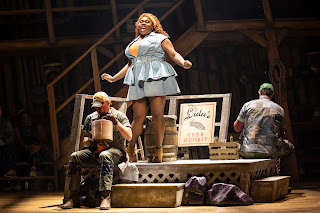Reviewed by Judd Hollander
Shucked, the new musical comedy at Broadway’s Nederlander Theatre has far too many corn-related puns, references, and innuendos to count. It’s also corn-poppingly funny.
The musical offers a retelling of a
With no one able to understand why this is happening, local farmer Maizy (Caroline Innerbichler), feels they must seek help from the outside world. However, most of her neighbors and friends, including Maizy’s beau, Beau (Andrew Durand) who she is about to marry, reject the idea out of hand.
The cast of Shucked. Photo by Matthew Murphy & Evan ZimmermanGordy is actually a failed conman, disowned
by his family due to his inability in the trade. At first, Gordy has no desire
to help Maizy. Until the stones in the antique bracelet she wears catches his
eye. After initially confirming the stones value, and how abundant they are in
For all its corn-spun humor – not surprising considering bookwriter Robert Horn’s first kernel of an idea for this show came from the television series “Hee-Haw” – at its core, Shucked stresses the importance of honesty, respect, and family. Family in this case referring not only to those related by blood, but those who are part of an extended community, all of whom depend on each other. There’s also the importance of not being afraid to consider something new, just because it may be different from what has gone before. A point illustrated in the ballad “Walls,” as beautifully sung by Innerbichler. This early number also establishes the show as something more than an elongated comedy sketch. Though to be fair, just about every third line in the show ends in a quip, pun or homily guaranteed to make the audience laugh, groan or nod in agreement. Many of these moments coming from Beau, his brother Peanut (Kevin Cahoon), and the show’s Storytellers (Ashley D. Kelley and Grey Henson).
Shucked isn’t so much a message show as a show with a message; and there is an important difference. That being the musical, which also has passing references to climate change and the current political environment, doesn’t repeatedly hit you over the head with what it wants to say. Rather, it tells a story with a few moral lessons embedded therein and leaves the audience to derive from it what they will.
The cast of Shucked. Photo by Matthew Murphy & Evan ZimmermanThe score by Brandy Clark and Shane McAnally is excellent, with highlights ranging from the over-the-top opening sequence “Corn,” to the comic “Bad.” There’s also the soulful “OK,” put forth by Durand; the rousing “Best Man Wins;” and the fantastic “Independently Owned.” That last, a powerful blues number by Newell, quite literally stops the show in its tracks and garners the performer a well-deserved standing ovation.
Innerbichler does a wonderful job as Maizy, a strong-willed though occasionally naive sort determined to save the town and get the respect she deserves. Durand works well as Beau, an earnest if somewhat stereotypical hayseed type. Behlmann is fine as Gordy, who learns there’s more to life than coming out on top. Newell is a wonder as Lulu. A cautious but caring cynic who learns to open herself up to the unexpected. Indeed, by the show’s end, all of the characters are significantly changed due to what they’ve experienced.
The cast of Shucked. Photo by Matthew Murphy & Evan ZimmermanJack O’Brien’s direction keeps the show moving nicely while never going off the rails into either parody or preaching. Sarah O’Gleby’s choreographic work is enjoyable from start to finish. Scott Pask’s set, basically a huge barn with all the requisite trimmings, nicely fits the show’s atmosphere. Also deserving of credit is Jason Howland’s excellent orchestrations.
Shucked offers jokes, music, a love quadrangle, and a bit of gentle moralizing. Most of all, it’s a lot of fun.
Featuring: John Behlmann (Gordy), Kevin Cahoon (Peanut), Andrew Durand (Beau), Grey Henson (Storyteller 2), Caroline Innerbichler (Maizy), Ashley D. Kelley (Storyteller 1), Alex Newell (Lulu).
Ensemble: Jimmy Brewer, Audrey Cardwell, Dwayne Clark, Rheaume Crenshaw, Jaygee
Macpugay, Scott Stangland, Yasmeen Sulieman, Quinn Vanantwerp
Shucked
Book by Robert Horn
Music & Lyrics by Brandy Clark & Shane McAnally
Scenic Design: Scott Pask
Costume Design: Tilly Grimes
Lighting Design: Japhy Weideman
Sound Design: John Shivers
Wig Design: Mia Neal
Music Supervision, Music Direction,
Orchestrations and Arrangements: Jason Howland
Choreographed by Sarah O’Gleby
Directed by Jack O’Brien
Nederlander Theatre
Tickets: 212-239-6200 or
www.ticketmaster.com
Info: www.ShuckedMusical.com
Running time: 2 hours, 20 minutes, one
intermission
Open run




.jpg)


Rebecca_Asher.jpg)
Rebecca_Asher.jpg)
Rebecca_Asher.jpg)




